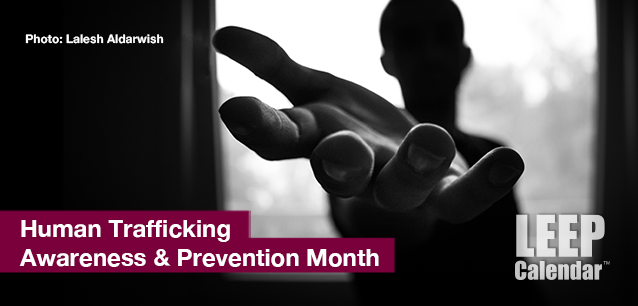 AD
AD
Today is: January 07
Scroll to explore events active on this date.
LEEP INK FEATURES

August? Absolutely!
In August, we live through the Dog Days of Summer. It's hot and often humid, and those who can leave for better climates do. Down south, winter is in full force. August is also known as "the ...

In The Heat of July: July 2025 Events
Is it hot enough (or cold enough if you're below the equator) for you yet? There is actually a day for that! Like every month, I pick a diverse collection of events you may or may not know about. This ...

May Blooms: Events in May 2025
Along with October, May is one of the most densely packed months of the year. It's before the summer humidity and the last whole month of the school year. The weather is warming in t...
About National Human Trafficking Awareness & Prevention Month
Safety & Security , Travel & Tourism
Competitions & Awards , United States
Ends: Jan 31, 2025
DESCRIPTION:
NATIONAL HUMAN TRAFFICKING AWARENESS
AND PREVENTION MONTH
National Human Trafficking Awareness & Prevention Month is an initiative of ECPAT-USA, an association of travel and entertainment companies that seeks to protect every child's fundamental human right to grow up free from the threat of sexual exploitation and trafficking.
Human trafficking is a significant and persistent problem in the United States, impacting thousands of individuals annually. It involves exploiting people through force, fraud, or coercion for labor or commercial sex. Victims can be of any age, gender, or nationality, though vulnerable populations, such as undocumented immigrants, runaway youth, and economically disadvantaged individuals, are most at risk. The United States is both a source and destination for trafficked individuals, with cases reported in urban, suburban, and rural areas.
MOST IMPACTED INDUSTRIES
Human trafficking occurs across various industries, but specific sectors are particularly vulnerable:
—Healthcare
Organ removal is a quickly growing segment of human trafficking.
—Sex Industry:
Coercion into prostitution, pornography, or other forms of commercial sexual exploitation is common.
—Agriculture and Food Processing:
Labor trafficking frequently occurs in these industries, where workers may face exploitation under harsh conditions.
—Domestic Work:
Forced domestic servitude, including housekeeping and childcare, is an area of victimization.
—Construction:
Victims are lured with jobs and forced to work in unsafe construction environments.
—Hospitality and Restaurants:
Exploitation in hotels, resorts, or food service roles is another area prone to human trafficking.
JOBS OFTEN HELD BY VICTIMS OF HUMAN TRAFFICKING
Jobs that allow traffickers to maintain control and minimize detection are preferred. These jobs include prostitution, janitorial services, farming, factory work, nail and hair salons, and caregiving roles. Workers are often isolated, poorly paid (if at all), and subjected to abusive conditions.
SIGNS OF HUMAN TRAFFICKING
Identifying a trafficking victim can be challenging, but typical indicators include:
—Appearing fearful, submissive, or overly anxious.
—Showing signs of physical abuse or malnutrition.
—Lacking identification or control over their documents.
—Working excessively long hours under poor conditions without breaks.
—Being accompanied by someone who controls their movements or interactions.
—Avoiding eye contact or evading conversations about their circumstances.
WHAT TO DO IF YOU SUSPECT TRAFFICKING
If you suspect trafficking:
—Do Not Confront the Trafficker:
Doing so can put you and the victim in danger.
—Gather Information:
Note details such as locations, descriptions, and any observable behaviors.
—Contact Authorities:
Call the National Human Trafficking Hotline at 1-888-373-7888 or text "HELP" to 233733. This confidential service connects you to resources and professionals who can assist.
—Alert Local Law Enforcement:
Report the situation to local police, emphasizing the potential trafficking situation.
—Support the Victim:
If you can safely do so, offer reassurance or resources, but prioritize professional intervention to avoid endangering the victim further.
National Human Trafficking Awareness & Prevention Month seeks to end the nightmare brought about by human trafficking. By staying vigilant and informed, individuals can play a critical role in combating human trafficking and helping victims regain their freedom and dignity.
VIDEOS
SUPPORTING DOCUMENTS
Currently, this event does not have supporting documents.
ADDITIONAL IMAGES
Currently, this event does not have supporting images.
Where would you like to go now?
 AD
AD


/footer-logo.svg)
